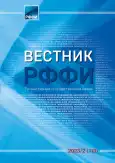Correlation of Identity Structure and Patriotism Patterns among High School Students in Siberian Regions
- Authors: Shashkova Y.Y.1, Aseev S.Y.1
-
Affiliations:
- Altai State University
- Issue: No 2(113) (2023)
- Pages: 49-60
- Section: WHAT THE WINNERS OF RFBR COMPETITIONS ARE WORKING ON: PHILOSOPHY. SOCIOLOGY. POLITICAL SCIENCE. JURISPRUDENCE
- URL: https://bakhtiniada.ru/2587-6090/article/view/305459
- DOI: https://doi.org/10.22204/2587-8956-2023-113-02-49-60
- ID: 305459
Cite item
Full Text
Abstract
The article is devoted to the analysis of the relationship between the structure of identities and patriotic models in the minds of school students in the regions of the Siberian Federal District. The theoretical basis of the study was both the concept of the "matryoshka" of identities and the theory of patriotism, considering its manifestations as a dichotomy of "blind" and "constructive", "emotional" and "activity" types. The empirical basis of the study was the results of longitudinal surveys of students in grades 9–11, conducted in 2020 in 10 regions and in 2022 in 4 regions of the Siberian Federal District. The use of cluster analysis made it possible to divide the studied population into 4 clusters: a cluster of “blind”, “active” patriotism with a strong institutional component, “constructive” patriots, “loyalists” and “silent ones”, determine the combination of identities corresponding to each cluster and trace their dynamics. As a result, conclusions were made about the decrease in the influence of the identity factor on the disengagement of young people in relation to patriotism and the possibility of reducing the indicated disengagements to the basic opposition of "patriots" and "non-patriots".
Keywords
About the authors
Y. Y. Shashkova
Altai State University
Author for correspondence.
Email: yashashkova@mail.ru
Doctor of Political Sciences, Professor of the Department of Philosophy and Political Science at the Institute of Humanities
Russian Federation, BarnaulS. Y. Aseev
Altai State University
Email: suass@mail.ru
Candidate of Historical Sciences, Associate Professor of the Department of Philosophy and Political Science at the Institute of Humanities
Russian Federation, BarnaulReferences
- Titov V.V. On the creation of the national identity of russian youth in the digital age. Tomsk State University Journal of Philosophy, Sociology and Political Science. 2020. №. 57. S. 257–264. doi: 10.17223/1998863Х/57/24 (In Russian).
- Ariely G. Why does patriotism prevail? Contextual explanations of patriotism across countries // Identities. 2017. №3. Р. 351-377. doi: 10.1080/1070289X.2016.1149069.
- Lu J. The Internet as a Context: Exploring Its Impacts on National Identity in 36 Countries // Social Science Computer Review. 2019. Vol. 37 (6). P. 705–722. doi: 10.1177/0894439318797058.
- Erez L., Laborde C. Cosmopolitan Patriotism as a Civic Ideal // American Journal of Political Science. 2020. №64. Р. 191-203. DOI: https://doi.org/10.1111/ajps.12483.
- Kalhun K. Nationalism. M.: «Territory of the future ». 2006 (In Russian).
- Kozyrev G. I. Patriotism and anti-patriotism as the causes of the conflict of identities in modern russian society // Sociology. 2020. № 2. S. 128–142 (In Russian).
- Dirksmeier P. The relationship between patriotism and regional identification: a cross-country analysis // The Annals of Regional Science. 2022. doi: 10.1007/s00168-022-01167-1 URL: https://www.researchgate.net/publication/362773749_The_relationship_between_patriotism_and_regional_identification_a_cross-country_analysis (accessed 03.04.2023).
- Vagina V. O. Patriotism versus nationalism in the elite Russian society // Caucasian Science Bridge. 2021. Vol. 4, №. 2(12). S. 155–159. doi: 10.18522/2658-5820.2021.2.15 (In Russian).
- Kurnosov K. V. Influence of patriotism on prevention of social and political conflicts in modern Russia // Economics and management: problems, solutions. 2020. Vol 3, № 7. S. 108-113. doi: 10.34684/ek.up.p.r.2020.07.03.013 (In Russian).
- Huddy L., Del Ponte A., Davies C. Nationalism, Patriotism, and Support for the European Union // Political Psychology. 2021. № 42. Р. 995-1017. DOI: https://doi.org/10.1111/pops.12731.
- Martynov M. Y., Fadeyeva L. A., Gaberkorn A. I. Patriotism as Political Discourse in Contemporary Russia // Polis. Political Studies. 2020. №2. S. 109-121. DOI: https://doi.org/10.17976/jpps/2020.02.08 (In Russian).
- Schatz R.T., Staub E., Lavine H. On the varieties of national attachment: Blind versus constructive patriotism // Political psychology. 1999. Vol. 20, №1. P. 151-174.
- Magaril S.A. Meanings of patriotism – historical transformations. Sociological Studies. 2016. №.1. S. 142–151 (In Russian).
- Sekerdej M., Roccas S. Love versus loving criticism: Disentangling conventional and constructive patriotism // Br. J. Soc. Psychol. 2016. Vol. 55. P. 499-521. DOI: https://doi.org/10.1111/bjso.12142.
- Selezneva А.V., Antonov D.E. The value bases of the civic consciousness of the russian youth // Tomsk State University Journal of Philosophy, Sociology and Political Science. 2020. № 58. S. 227–241. doi: 10.17223/1998863X/58/21 (In Russian).
- Goode J.P. Patriotic Legitimation and Everyday Patriotism in Russia’s Consti-tutional Reform // Russian Politics. 2021. №6(1). Р. 112–129. DOI: https://doi.org/10.30965/24518921-00601007.
- Gulyaeva L. V., Yefimova G. Z. A Comparative Study of the Patriotic Attitudes of Youth: Regional Specificity // Siberian Socium. 2018. Vol. 2. № 1. S. 53-73. DOI: https://doi.org/10.21684/2587-8484-2018-2-1-53-73 (In Russian).
- Mokerova J. V. The concepts of the motherland and of patriotism among young people (on the example оf the Sverdlovsk region) // The Kazan Socially-Humanitarian Bulletin. 2022. № 4(55). S. 39-49. DOI: https://doi.org/10.26907/2079-5912.2022.4.39-49 (In Russian).
- Malenkov V. V. Patriotism, civicism in politics and identity of youth // Tomsk State University Journal of Philosophy, Sociology and Political Science. 2022. № 67. S. 120–131. DOI: https://doi.org/10.17223/1998863Х/67/11 (In Russian).
- Semenenko I.S. Civic identity as a national resource for development: report of the Fifth All-Russian Congress of Political Scientists. Moscow. 2009. URL: https://www.civisbook.ru/files/File/Semenenko_RAPN.pdf (accessed 01.04.2023) (In Russian).
- Goode P. Everyday patriotism and ethnicity in today's // Russia Before and Af-ter Crimea: Nationalism and Identity, 2010-2017. Edinburgh: University Press. P. 258-281. doi: 10.1515/9781474433877-016.
- Finell E., Zogmaister C. Blind and constructive patriotism, national symbols and outgroup attitudes // Skandinavian Journal of Philosophy. 2015 Vol. 56. № 2. P. 189-197.
- Inglehart R., Welzel C. Modernization, Cultural Change and Democracy: The Human Development Sequence. M.: «New publishing house», 2011 (In Russian).
Supplementary files









